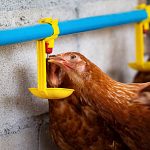
When chickens drink more water during hot weather, new chicken keepers often become alarmed and worry that something is wrong. But increased water consumption during summer is perfectly normal. It is one of the ways chickens keep cool. The water intake of chickens varies for many other reasons besides hot weather. Some of those factors […]
Continue Reading
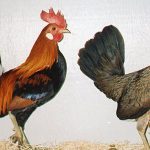
The average well-cared-for chicken may live 8 to 10 years. Some chickens survive 15 years or more. Many factors contribute to a chicken’s longevity. Some of these factors relate to genetics. Other factors have to do with good management. Guinness Records The first chicken recognized by Guinness World Records as the World’s Oldest Living Chicken […]
Continue Reading
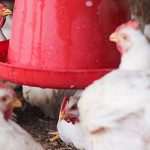
A lot of chicken keepers are fond of adding vinegar to their chickens’ drinking water. Chickens like the taste of vinegar in mild doses — one tablespoon vinegar per gallon of water. And since hens run the risk of dehydration during hot summer weather, many backyard keepers add vinegar to chickens’ water to encourage their […]
Continue Reading

A chicken normally breathes with a closed beak. A chicken breathing with an open beak is either ill or under stress — perhaps from heat or anxiety. Respiratory diseases of chickens usually include additional signs, such as sneezing, coughing, wheezing, a runny nose, or sticky eyes. Most respiratory infections are highly contagious. Some result from […]
Continue Reading
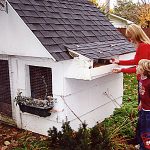
As exciting as it is to get new chicks in spring, even more exciting is finding their first eggs in the fall. As your pullets grow, you’ll naturally wonder when to expect your chickens to starting laying eggs. The answer depends on their state of health, their diet, their breed, and their age. Health A […]
Continue Reading
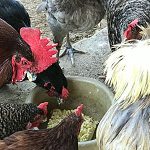
Listing all the things chickens will eat that are good for them would be nearly impossible. Chickens will eat just about anything, and the few things that aren’t good for them aren’t good for humans, either. Still, let’s take a quick look at some of the safe kitchen scraps for chickens. Fruits Chickens love just […]
Continue Reading

FREE SHIPPING on all supply order totals exceeding $25.00.
Continue Reading

FREE SHIPPING on all supply order totals exceeding $25.00.
Continue Reading

FREE SHIPPING on all supply order totals exceeding $25.00.
Continue Reading

Yes, chickens really do need a dust bath. Providing a suitable area for dust bathing has several benefits. It helps chickens condition their feathers. It minimize mites and lice. And it gives chickens something pleasurable to do, which helps keep them from pecking each other out of boredom. Plus wallowing in dust can help chickens […]
Continue Reading










